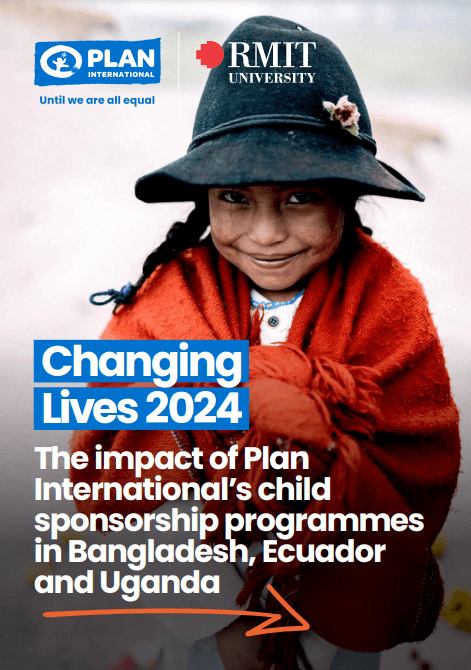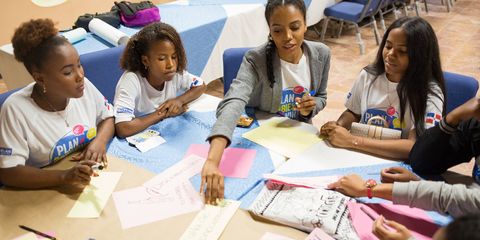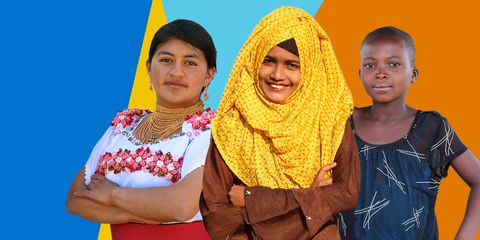Changing Lives 2024
The impact of Plan International’s child sponsorship programmes in Bangladesh, Ecuador and Uganda.

Child sponsorship is a cornerstone of Plan International’s work with children and their communities. Through child sponsorship, Plan International is engaging with more than 1 million children in 44 countries around the world, creating meaningful, lasting change for children, their families and communities.
Plan International aims to achieve maximum impact and strives for continuous programme and quality improvements. This has led to an action-oriented research series – Changing Lives in collaboration with RMIT University– on the impact of child sponsorship.
The learning journey has, so far, produced the following studies:
- 2022 – Snapshot of the Child Sponsorship Data
- 2023 – Secondary data analysis on the impact of child sponsorship
- 2024 – The impact of Plan International’s child sponsorship programmes in Bangladesh, Ecuador and Uganda
The 2024 study with RMIT University collected primary data in Bangladesh, Ecuador and Uganda. To assess the impact of child sponsorship in terms of children’s development outcomes, survey data and semi-structured interviews was collected from Plan International communities and comparison sites.
Key findings:
The 2024 Changing Lives research concludes that the long-term community- based approach of child sponsorship is beneficial for children and their communities. It shows that child sponsorship contributes positively to development outcomes for children in different ways depending on context.
Findings include:
- Within Plan International communities, findings show that school enrolment rates and attendance rates are high in all research sites.
- Sponsored adolescents report generally good health across all research sites. In Uganda, self-reported good health for adolescents in Plan International communities was 19 per cent higher than for those in comparison sites.
- In Bangladesh, more than 91% of adolescents in Plan International communities know where to report harm to children, compared to 82% in the comparison site in Bangladesh.
- Plan International programmes help to alleviate poverty and project-based training widens the opportunity to develop income-generating skills.
- Positive community changes in Plan International sites include increased collaboration and addressing gender-based violence.
- An overarching conclusion is that the long-term community-based approach of child sponsorship is beneficial for children and their communities.
Recommendations and response
As an evidence-based and learning organisation, Plan International is committed to using the evidence from the Changing Lives Sponsorship Research Series to inform and improve our work and sponsorship approaches. Findings from this study will be used to inform the Next Gen Sponsorship initiative aimed at revitalising and evolving our sponsorship model.
This report includes recommendations to enhance the impact of child sponsorship programmes across the development sector with specific action points specific to Plan International.
Next Gen Sponsorship
Sponsorship lies at the heart of Plan International – it’s a key component of how we reach and impact girls and young people. As the world continues to change, it is clear we need to reframe how we think about and implement our sponsorship work, so that we can be in the best possible position to achieve our ambition to reach 200 million girls.
Next Gen Sponsorship was launched in 2024 to revitalise Plan’s sponsorship by keeping the best of what we have and building and expanding on it to appeal to new sponsors in new ways. Modernising our sponsorship model will help us explore new avenues for fundraising, make frontline work more efficient, and create more impact for girls and young people worldwide.
Downloads
Changing Lives – Full Report
4.19 mb
Changing Lives – Summary Report
1.85 mb
Changing Lives – Full Report (Spanish)
4.23 mb
Changing Lives – Summary Report (Spanish)
1.91 mb
Changing Lives – Full Report (French)
4.26 mb
Changing Lives – Summary Report (French)
1.92 mb


